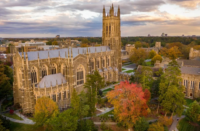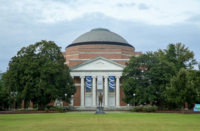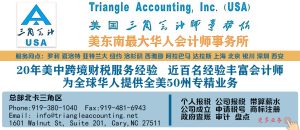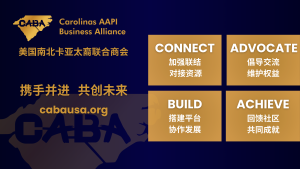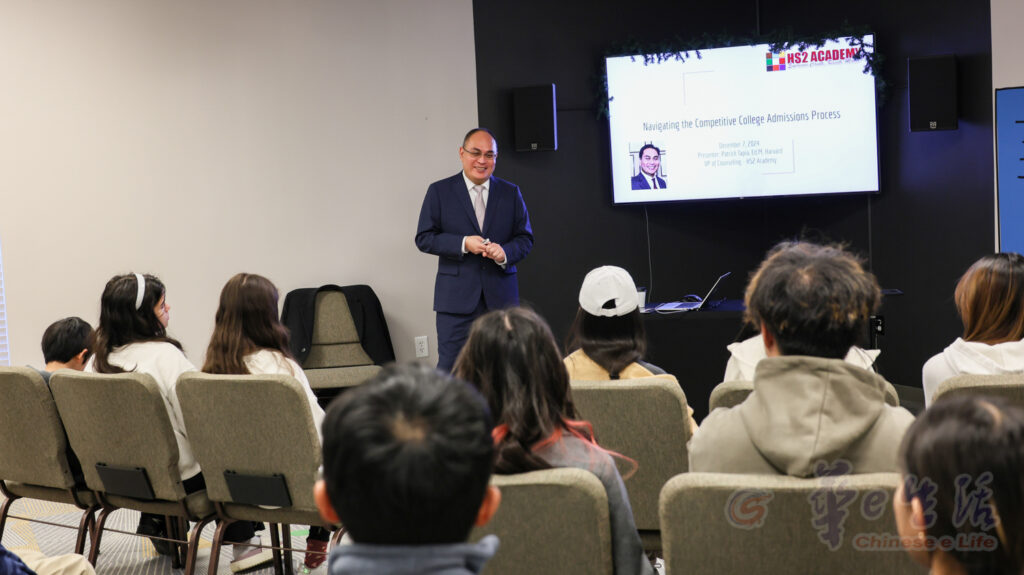
编者按:
12月7日,北卡北卡罗来纳州的三角学院(Triangle Learning Academy)特邀总部在加州的教育机构HS2 Academy(哈佛全方位)来到北卡,传授大学申请规划和注意事项。
【华e生活】特约青少年记者慎奥锐( Elizabeth Shen)倾听曾担任哈佛大学面试官资深大学升学顾问 Patrick Tapia带来的讲座,“对接”到对一个10年级学生来说认为重要、有用的信息和启发。
特别说明:慎奥锐用英文报道这次讲座。中文系【华e生活】编辑编译。
华e生活 特约青少年记者 慎奥锐 凯瑞 Green Hope 高中10年级学生
Patrick Tapia 是一位拥有超过20年教学经验的高中 AP 英语教师,始终站在教育的最前沿。
他拥有哈佛大学高等教育硕士学位,对不断变化的大学录取环境有着深刻的理解。作为一名有七年经验的哈佛大学面试官,他深知大学在挑选学生时的考量重点。
在 COVID-19 疫情期间,录取标准发生重大变化,Tapia 鼓励学生和家长充分了解大学录取的竞争性,以提高成功的机会。
他共同创办了 HS2 Academy(哈佛全方位),这一项目提供全面的大学申请课程,包括 SAT 和 ACT 准备、写作辅导及个人陈述培训等。
了解环境:从录取率的变化说起
近年来,大学录取的背景发生了显著变化,特别是在 COVID-19 期间。随着许多高校采取“可选择是否提交考试成绩”(test-optional)政策,录取率大幅下降。例如,杜克大学的录取率从12%降至仅5%。一些原本被视为“保底学校”的大学也出现了显著降幅,包括南加州大学(9%)、纽约大学(8%)、东北大学(5.2%)、莱斯大学(7.5%)以及波士顿大学(10.85%)。这些变化突显出大学录取竞争日益加剧,申请者需制定有效的策略应对。
大学排名中的重要考量因素
Tapia 建议,学生在搜索大学时,不仅要关注排名,还应考虑他们的目标专业和学校的地理位置。地理位置在建立人脉方面可能具有重要作用。例如,对技术初创公司感兴趣的学生可以选择伯克利大学,它毗邻硅谷,提供许多实习和网络拓展的机会。成功的申请者应根据个人目标,找到对自己最重要的因素,而不是单纯依据排名决定。
申请者如何脱颖而出?
Tapia 认为,在某一领域展现卓越能力至关重要。他指出,作为哈佛的面试官,他特别看重每位面试者在某个领域展现出的激情和潜力,以期达到卓越水平。虽然全面发展的学生具有价值,但 Tapia 表示,最具吸引力的学生往往在全面发展的基础上,在某一领域拥有“突出亮点(spike)”。
领导力也是申请中不可或缺的亮点,可以通过担任职务、指导他人或创建俱乐部等方式展现。申请时,展现创意和原创性也能吸引录取官的目光。
此外,独特的个人经历、跨学科兴趣以及能与专业互补的课外活动都可以帮助申请者在激烈竞争中脱颖而出。
申请者应避免使用陈词滥调,如讲述克服困难的老套故事,或仅将文章写成成就清单式的简历。关键是展现对目标学校的真正兴趣,并确保个人陈述能够真实反映申请者的个性和内心。
时机与呈现方式同样重要
Tapia 强调,申请时间也是成功的重要因素。他建议学生在截止日期前两到四周提交申请,这样可以更早进入评审流程。这种策略能让申请者成为首批被考虑面试的学生,因为录取官通常会提前审阅申请材料。
他还特别反对拖延行为,认为这容易导致错误,尤其是在需要清晰和深刻表达的文章写作上。
对于对某所大学有强烈意向的申请者,提前决定(Early Decision)录取率往往较高,是值得考虑的途径。
社交媒体和推荐信的重要性
在数字时代,录取官常常会查看申请者的社交媒体资料,因此保持积极的线上形象尤为重要。Tapia 还提到强有力的推荐信对申请的重大影响。
跳出传统思维
随着申请流程日趋复杂,学生应跳出排名和传统路径的限制。许多文理学院被像哈佛这样的一流机构视为等同于常春藤盟校的学校。这些学校通常提供紧密的师生互动和良好的人脉网络,尤其是位于主要大都市地区的学院。此外,由于班级规模较小,教授推荐信的质量通常更高,这在申请研究生时更具优势。
结语:了解自我与局限
Tapia 鼓励潜在学生(申请之前几个年级)深入了解自己——认识自己的优点、缺点和局限性。这种自我认知将帮助他们找到最适合的教育选择,为大学和研究生阶段带来更充实的体验。
在大学录取竞争日益激烈的情况下,像 Patrick Tapia 这样的专业人士提供的见解,能为学生顺利驾驭这一复杂过程提供有力工具。掌握正确策略后,学生可以自信地朝着自己的教育目标迈进。
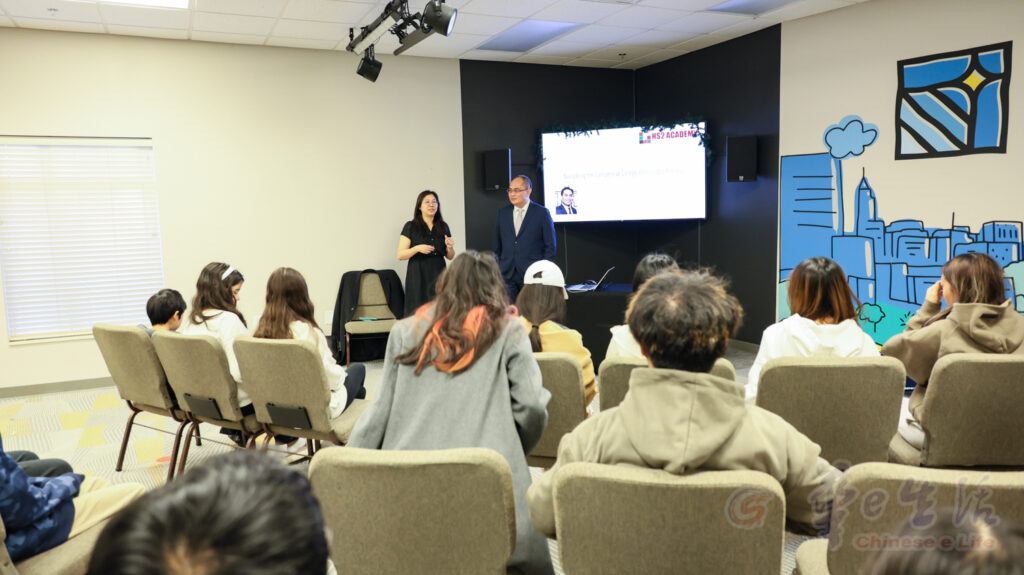
Navigating the Competitive College Admissions Landscape: Insights from Patrick Tapia
■By Elizabeth Shen, 10th Grade, Green Hope High School
Patrick Tapia, an experienced high school AP English teacher, has been at the forefront of education for over 20 years. With a Master’s in Higher Education from Harvard University, Tapia has a wealth of knowledge about the ever-evolving college admissions landscape. As a Harvard interviewer for the past seven years, he is acutely aware of what colleges are seeking in prospective students. In light of recent shifts in admissions criteria—especially during the COVID-19 pandemic—he encourages students and parents to comprehend the competitive nature of college admissions to enhance their chances of success. He co-founded HS2 Academy, a program that offers comprehensive courses on college applications, from SAT and ACT prep to writing essays and personal statements.
Understanding the Landscape: A Shift from Acceptance Rates
The backdrop of college admissions shifted significantly in recent years, particularly during COVID-19. With many institutions adopting test-optional policies, acceptance rates tumbled. For instance, Duke University witnessed a drop from a 12% acceptance rate to just 5%. Schools that were previously regarded as safeties have also experienced notable decreases. These include the University of Southern California (9%), New York University (8%), Northeastern University (5.2%), Rice University (7.5%), and Boston University (10.85%). Such declines highlight the intensifying competition for college admissions, making it vital for applicants to strategize effectively.
Key Considerations in College Rankings
As students begin their college search, Tapia advises that they not only look up rankings but also consider factors like their intended majors and location. Location can be beneficial in terms of networking. For instance, a student interested in technical startups may benefit from a university like Berkeley, which offers access to Silicon Valley with many internship and networking opportunities. The most successful applicants should discern what’s most important for their personal goals, not solely based on rankings.
What Can Applicants Do to Stand Out?
According to Tapia, demonstrating excellence in a specific area is crucial. Tapia emphasizes that when he interviewed for Harvard, he looked for passion and potential in every interviewee to reach considerable levels of excellence in their defined field. While well-rounded students are valuable, Tapia described the most desirable student to be well-rounded overall, with a ‘spike’ where they stand out. Leadership roles—through titles, mentoring, or by establishing clubs—are also essential to highlight. When applying, an applicant’s ability to display their creativity and originality can also capture the attention of admissions officers.
Unique personal circumstances, interdisciplinary interests that complement one’s major, and extracurricular activities can also set students apart in a competitive pool. Candidates should avoid cliché tales of overcoming adversity, or simply an essay listing their achievements much like a resume would. He says the key is to demonstrate genuine interest in that specific school, and make sure the personal statement represents who the applicant truly is.
Timing and Presentation Matter
Timing is another crucial aspect to admissions success. Tapia recommends submitting applications two to four weeks before deadlines to ensure they are seen early in the evaluation process. This strategy allows applicants to be among the first considered for interviews, where admissions officers often start reviewing files ahead of due dates.
Advising against procrastination, Tapia underscores that it leads to increased chances of error, especially with essays that require clarity and substance. Early Decision acceptance rates often soar, making this route a viable option for committed candidates.
The Importance of Social Media and Recommendations
In today’s digital age, admissions officers frequently review applicants’ social media profiles, making it imperative to maintain a positive online presence. Tapia also points to the significance of strong recommendation letters.
Think Outside the Box
As the admissions process becomes increasingly complex, it’s crucial for students to look beyond rankings and traditional pathways. Many liberal arts colleges are viewed equivalently to Ivy League schools by prestigious institutions such as Harvard University. These schools can provide environments that foster close-knit interactions and substantial networking opportunities, particularly those located in major metropolitan areas. Additionally, due to the smaller class sizes, recommendations from professors are often higher quality, leading to an advantage when applying to grad school.
Conclusion: Know Yourself and Your Limitations
Ultimately, Tapia encourages prospective students to know themselves well—understanding their strengths, weaknesses, and limitations. This self-awareness will help them identify the right fits for their educational journeys, leading to enriching experiences during both undergraduate and graduate studies.
With college admissions growing more competitive each year, insights from professionals like Patrick Tapia can equip students with the necessary tools to navigate this intricate process successfully. Armed with the right strategies, students can aspire toward their educational goals with confidence.


